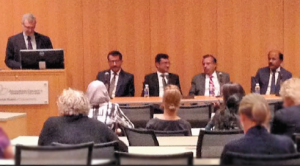BY VALERIE VELIKAYA

A panel of Pakistani educators discussed the role education plays in the fight against terrorism in their homeland.
Five professors from the Sukkur Institute of Business Administration (IBA) in Sukkur, Pakistan held a conference in the Hudson Auditorium last Thursday, Sept. 18.
The institute is Pakistan’s first community college, and JCCC, funded by a U.S. Embassy grant, collaborated with Sukkur leaders to create a developmental educational program in order to strengthen the country’s literacy rates while discouraging terrorism involvement in the youth.
Approximately 40 attendees listened to each instructor express their dismay with the educational system in Pakistan.
“It’s a problem, and we think that it’s not only our problem, but a problem of the world,” said Noor Hussain Shar, coordinator, IBA Community Colleges. “It’s a problem of terrorism living on the globe.”
According to the South Asia Terrorism Portal, 3,268 deaths were recorded last year, and as of today, over 2,467 fatalities since the beginning of the year – all associated with major acts of terrorism in Pakistan.
In March, about 19 civilians, including 10 women and four children, were killed as a result of gang-related violence. The number of casualties continues to escalate due to unhindered terrorist attacks.
Lack of attention towards the educational system, renders the country vulnerable to violent acts, said Sher Muhammad Daudpota, director, Replicating Community College Best Practices.
“If we address those issues then I think we’d be in a better position,” he said. “The whole world will be in a better position to fight against the terrorism and then every educational institution … will take responsibility.”
“The solution is very, very simple,” said Ali Gohar Chang, principal, Public School Sukkur. “We need to provide every kid a revision; we need to provide every kid with facilities and we have to make sure that all the teachings … educate our children and then make sure, making sure that they have a normal life.”
According to Nisar Ahmed Siddiqui, director and dean of Sukkur IBA, 50 percent of Pakistan’s population is within the age group of 15 to 23. UNICEF lists the male population as currently holding a literacy rate of 79.1 percent while the female rate falters at a 17.6 percent difference; 60 percent of the population is working for an education while 40 percent have never seen a school.
“We have to find out the reason for each type of terrorism activity … and then erase it,” said Siddiqui. “All these reasons can be eliminated [with] education.”
The long-term solution is education, he said.
Contact Valerie Velikaya, managing editor, [email protected]





















